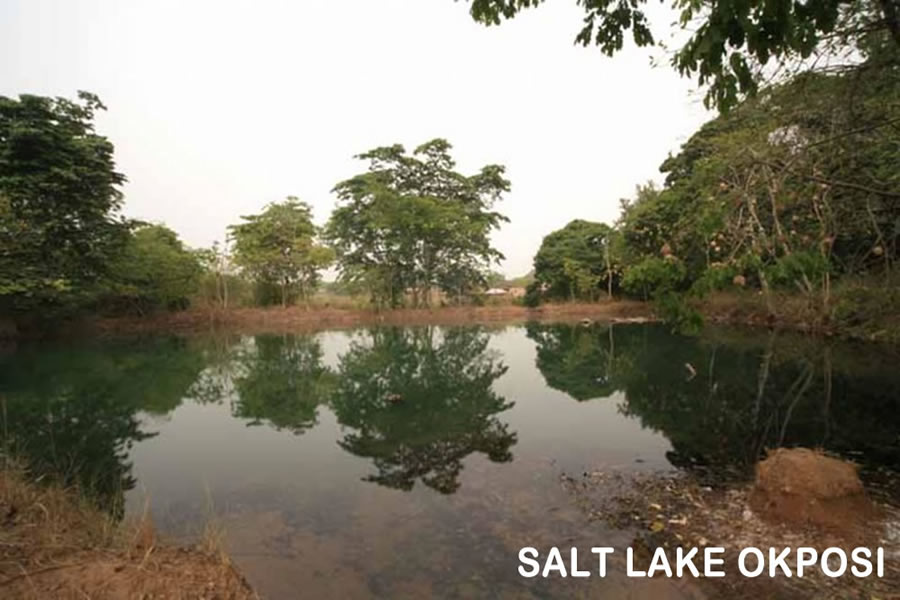History: Uburu And Okposi Salt Lake In Ebonyi State
Ever wondered why Ebonyi State is called “Salt of the Nation”?
There are two major salt lakes in Ebonyi State namely Uburu Salt Lake and Okposi Okwu Salt Lake also known as “Mmahiezi”. According to history, the salt lake of Okposi was discovered by two hunters, Ekwna Chita and Uta Anoo, who were intrigued by the salty taste of the water and its inability to quench their thirst. When they made their findings widely known to their people, the women, following the mythical instructions of the goddess Mmahi, came up with a method of processing the salt using solar energy. From then on, only women were allowed to fetch water from the lake and take it for processing at the ‘ewe hut’. The salt lake is a greenish, circular patch surrounded by trees that seem to be windblown towards the water. Although Uburu is larger than the Okposi Salt Lake, Okposi is more vital to the Ebonyi State’s economy, attracting dealers from the north and east to its famous Odenigbo Okposi market.
Uburu Salt Lake
During the Biafran/Nigerian civil war (on 6 Jul 1967 – 15 Jan 1970) the Okposi and Uburu salt were used. The brine from Okposi Salt Lake had the highest salinity among all lakes in Eastern Nigeria according to the Biafran scientists, after series of tests. They built an industry close to the lake and taught the local women new production techniques, including the use of “alom” to effect sedimentation of dirt before decantation and final filtration. Though the industry is dilapidated, it still stands as a monument till date.

According to Refinedng, History had it that the salt lake triggered the development of an interesting mud-like local technology where the salt is processed by indigenous women of the town, who intuitively employ solar energy (natural sunlight) as a source for processing the salt. The local industry, otherwise called industrial hut is popularly referred to as “Ewe”, and it is privately owned by different women.
Salt Making as an Initiation into Womanhood
Salt making was the major enterprise of Ebonyi women. It was used as an initiation into womanhood. Once a young woman completes her honeymoon, she is immediately initiated into the business of salt making by older and experienced women.
Before the initiation, her older friends and relations find a convenient day when they would fetch enough pots of the saltwater (brine) for her. On a set day, the brine would be used to make a puddle (mixture of clay and water) with which the Ewe (hut) would be built. The same puddle will also be heaped at the front of the hut to form a huge mound of earth called “okperede.” The essence of this is to make a hillock that will serve as a preservation for the salt crystals once it is completed.
The initiation process is guided by rules which must be duly observed. The initiate for instance will have to fetch brine directly from Mmahiezi, the main Salt Lake or from Enyanwu, a supporting pond. The initiate must improve the mound built and pour enough brine on it just so it gets rich in salt crystals. Often, the puddle is left to dry up for some hours or days, depending on the weather. The hardened puddle is further broken into smaller pieces and poured into “ofufu”, a perforated pot. All these processes are just to set up a shard that will serve as a simple sand filter once it is filled with the salty earth.
Traditional Salt Production
The salt was previously extracted by boiling but considering that Okposi is hardly surrounded by wood, the” Oreohu” pot was devised as an evaporation vessel. Much later, kerosene tins were used and recently, enamel basins became essential for the extraction of salt. The salts were baked to preserve, package and market them. Soon, local women were taught how to use alum to sediment dirt.
However, since the advent of industrialized salt production in contemporary Nigeria, salt processing took a different method. The Salt Lakes of Ebonyi made the state prominent amongst other neighbouring states as the salt attracted business inclined individuals from various parts of the country. On several occasions, Okposi salt has served as the major supply to Eastern and Northern Nigeria.
The Uburu and Okposi salt lakes are in Uburu and Okposi respectively; Uburu Lake is the larger of the two. I believe by now you should know where Ebonyi State got its slogan “THE SALT OF THE NATION”.
 Igbo Language & Culture
Igbo Language & Culture
